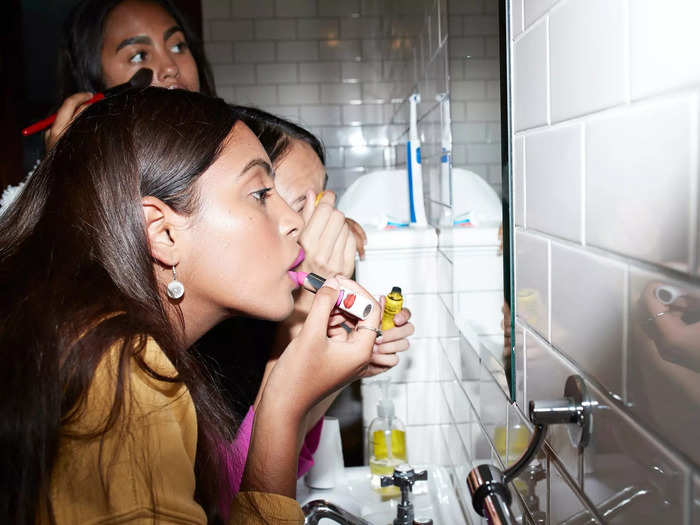A man fixes his hair (stock image).Tim Robberts/Getty Images
- Narcissists often follow the same pattern in relationships: idealize, devalue, discard.
- They also have a certain way of talking to manipulate their victims.
It's possible to meet someone and feel like you've known them your whole life. Often, this just means you're comfortable in each other's company.
But sometimes it can be a sign of something more sinister — particularly if someone you're dating is professing their love for you when you've only known them for five minutes.
Narcissists sometimes engage in "love bombing" — pretending to be everything you've ever wanted, only to turn it back on you further down the line. It's a manipulative tactic to reel in their targets. First, they shower them with affection and gifts. Then, they start gaslighting and abusing their victim, causing them to wonder what's real. It's all part of the plan to gain total control.
Although there's no global summit for all dark triad people to get together and discuss their tactics, they do seem to operate in a similar way.
"It's like they read from the same manual, even though nobody gives them that manual," said psychologist Perpetua Neo, who works with victims of narcissistic abuse. "They're almost programmed in the same way."
Here are certain phrases narcissists use, and ways they express things, that may be eerily familiar to anyone who has dealt with one.
They love bomb you during the idealization stage.
The Good Brigade/Getty Images
Relationships with narcissists move very quickly. Neo said some people simply do mesh really well, because they have similar interests and complement each other's differences.
"But anybody who tries to do it too quickly early on is basically accelerating intimacy, and that is bad news," she said. "Anybody who has to do that suggests they are doing something a bit creepy."
In the first few weeks narcissists will say things like:
"You're my soul mate."
"I've never met anyone like you before."
"You understand me so much better than anyone else."
"It's fate that we met."
"I've never felt this way about anyone before."
"Am I your only friend? You're my only friend."
"We don't need anyone else."
"You're so kind, creative, smart, beautiful, and perfect."
"We'll be together forever."
Then the devaluation stage happens.
A couple fighting. Gorodenkoff/Shutterstock
Once a narcissist has hooked their victim, they start showing their true self. This is where the insults and put-downs start slipping into what they say. They suddenly criticize things about the partner that they once seemed to love — everything they say is part of their scheme to shatter their partner's confidence.
But the nastiness is intertwined with some affection, because the narcissist knows they have to keep up the illusion that the relationship is worth saving. By pretending they can still be loving, the narcissist makes their victim believe the insults are their own fault.
During this phrase narcissists may utter some of these phrases:
"You're crazy."
"You're too sensitive."
"No wonder nobody else likes you."
"My friends hate you, but I always defend you and have your back."
"You're so insecure."
"What's wrong with you?"
"Aren't I more important to you than your friends?"
"Your tears won't work on me. Why are you crying?"
"You're being so manipulative."
They will explain away their behavior.
SimonSkafar/Getty Images
Alena Scigliano, a licensed psychotherapist, author, and clinical expert in narcissistic abuse, told Insider many of the phrases that pathological narcissists use fall under the manipulative tactic category she refers to as "distraction."
"For example, narcissists may deflect, project, victimize themselves, or scapegoat another person as a means to distract someone from focusing on a failure or shortcoming of the narcissist," she said. "Projection is an example of deflecting back onto the accuser."
They will probably start explaining away their behavior if they are ever challenged on it, saying things like:
"I'm like this because my parents were so mean to me."
"My ex cheated on me."
"Love is just hard. We have to work on it."
"Everyone abandons me, so you have to help me."
"I'm acting this way because I'm scared to lose you."
"I don't do it on purpose; I have a problem."
"Don't you remember how good things were at the start?"
"You need to stop being so selfish/careless/busy with other people."
"You can't blame me, you know I have a problem."
The will criticize everything their victim loves and isolate them.
LightField Studios/Shutterstock
A person in a relationship with a narcissist is subject to constant criticism, said the psychiatrist Dr. Edward Ratush in an interview with Insider.
"The love they receive can feel transactional, as a narcissist's need for acceptance and constant approval sucks up all the light and leaves their partner forever in the shadows," said Ratush, who founded the mental-health platform SOHOMD.
They'll try to devalue everything their victim loves, such as their interest and hobbies, and even their family. They'll insult everything they can, saying things such as:
"I don't like your friends — they're not good enough for you."
"You like that? It's terrible."
"I can't believe you enjoy doing this."
"Your family doesn't like me. You probably shouldn't see them as much."
"If you leave and see your friends, I'll be angry."
They will guilt-trip you and make you feel 'lucky.'
g-stockstudio/Shutterstock
Clinical psychologist Lauren Cook told Insider that narcissists know how to induce guilt and indebtedness fast. This creates a power divide in the relationship, she said, and makes them the "dominant" partner.
"They may be quick to say, 'If you really loved me,' or 'If you really cared,' rather than try to earn your respect or take your feedback that you need to set a boundary," she said. "They try to lay the guilt on thick so that you feel like you're a 'bad person' for not doing everything in your power to make the narcissist feel special."
They may say:
"You're lucky to be with me."
"You're lucky to be in my presence."
"You're so fortunate to be receiving my time and attention with everything else I have going on."
They play to their advantages.
Klaus Vedfelt/Getty Images
Narcissists also play to their advantages, especially if they are older than their victim, or brought them over from a foreign country.
They'll assert their authority by saying:
"I've been through more relationships, so this is why I'm saying this."
"You can't wear that, because I said so."
"That makes you look stupid."
"Your dress is too short."
"You know I'm smarter. You know I know more about this than you."
"I'm the local here, I know better."
They will wear you down.
Sinan Saglam / EyeEm
When a narcissist has completely worn their victim down, they may tire of them. It might be because they've bled them dry of funds, or they've simply found someone new to abuse. Either way, at this stage their insults will reach the worst level, and they'll find more ways to tear their partner down, ensuring they leave the relationship as the "winner."
They'll hurl poison at their victim, such as:
"Everybody hates you."
"You're a bad person."
"Nobody else will ever love you."
"I'm the best you'll ever have."
"Have fun being alone for the rest of your life."
"You did this to yourself."
It will only get worse.
SrdjanPav/Getty Images
The only way to escape a narcissist's insults and threats is to get away from them, and run fast and far, Neo said. They keep their victims in a constant state of stress, and they know exactly where to dig the knife in deeper.
"So you are just kept on your toes, and bending further backwards like a dancing monkey," Neo said. "And nothing will ever change — things will just get worse."
Leaving a narcissist can resemble "defending oneself against a shark," said Ratush.
"You have to punch them right in the nose," he said. "Despite the fierceness of their appearance, they often crumble when confronted. Their bullying ways will quickly dissolve and reveal what's beneath."
The best defense you have against their words is your sense of self, he added — knowing exactly what your needs are and how they can be used against you.
"As the master manipulator, the narcissist will know how to influence your thoughts and behaviors," Ratush said. "Self awareness offers the best defense against those tactics."
If you suspect you might be in an abusive relationship, or you know someone who is, there are services you can reach out to. The MyPlan App from One Love and the National Domestic Abuse Hotline are resources that can help.
This article was first published in August 2018 and was updated in February 2023 to include more experts and new information.








